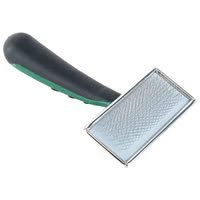 I had a tenet from Jean Liedloff's The Continuum Concept illustrated in a charming way for me the other day.
I had a tenet from Jean Liedloff's The Continuum Concept illustrated in a charming way for me the other day.Our poor cat is going through her spring shedding season, so she is always itchy, and frequently vomiting. Mrs. Pim has taken to rubbing against us more than usual, and selecting even Mikko for her stropping target, when usually she stays a careful tail-grabbing-arm's length away. I've been trying to brush her more to get all the dead hair out and away from her GI tract.
Apparently, Mikko noticed. He has a new way of telling us that he wants something. It's a combination of a guttural whine and a lurch toward the object in question. It's not all that attractive a communication style, but I'm pleased that he's beginning his march toward speaking.
So he did the whine-lurch toward the brush, and I finished up a few swipes on our poor shedding cat, quickly cleaned out as many of the hairs as I could before the grunts escalated into screams, and handed off the brush to Mikko. (Yes, I usually find it easier to give in to exploration than to distract or discourage.)
I thought that's all he wanted, but instead of just sticking the juicy rubber handle into his mouth as he usually does (where squeak, squeak, squeak go his teeth), he immediately reached out and clumsily patted Mrs. Pim with it. Granted, he used the backside of the brush instead of the bristles, and he simultaneously used his other hand -- either to hold her in place or to clear off the fur as he sees me do, I'm not certain. The really incredible thing was that Mrs. Pim didn't take a swipe at him as she has recently been wont to do. She must really be itchy!
She kept circling around, and Mikko kept butt scootching after. He began to look exhausted but remained determined. It's hard to bum scootch and keep up with a cat! (He really should learn from her about crawling on all fours!) Anytime she was in range, he reached out with his two-handed brush/finger combo, and didn't even yank her fur.
It made me think of this section from The Continuum Concept, which captured my interest in particular as we run a home business and have dreams of Mikko entering into it with us one day (one day soon!):

She lost interest in less than a minute and ran off, leaving her little grater in the trough and no noticeable inroads on the manioc. No one made her feel her gesture was funny or a 'surprise'; the women did, indeed, expect it sooner or later, as they are all familiar with the fact that children do join in the culture, though their approach and pace are dictated by individual forces within themselves. That the end result will be social, cooperative, and entirely voluntary is not in question." (p. 83 in my copy)
When Mikko started brushing Mrs. Pim, this little grater girl leapt to mind, and I tried so hard not to act surprised -- and soon gave up in glee. I just thought it was so dang cute! I called Sam over to watch and kept exclaiming, "See, he's doing it again!" So, yes, I failed at being a tribal continuum mama, but the wonderful thing is my baby is being a perfectly successful continuum baby!
I've been thinking of this whole issue of innate sociality/innate cooperativeness as I have had several recent conversations with teachers and parents about "setting limits" and not letting children walk all over you and how discipline needs to begin early.
It all can be summed up under the heading: "Assume the worst."
Here the quote above continues:
"That the end result will be social, cooperative, and entirely voluntary is not in question.
[...] Above all, the child's persona is respected as a good thing in all respects. There is no concept of a 'bad child,' nor, conversely, any distinction made about 'good children.' It is assumed that the child is social, not antisocial, in his motives. What he does is accepted as the act of an innately 'right' creature.
[...] The assumption of innate sociality is at direct odds with the fairly universal civilized belief that a child's impulses need to be curbed in order to make him social."
I have a lot more to say about this subject, but I'll leave it at the cat-brushing story for now. I'll just say outright that my parenting goal is to assume the best instead. It makes life so much more pleasant, even if it does still surprise cynical me when it works.
My 11-month-old has seen me brush the cat a handful of times in his short life, and already he wants to do the same. The tendency is to fit in, as I mentioned already. And even our cat thinks that's a good thing.









 I'm Lauren Wayne, writer and natural parent. I embrace attached parenting with an emphasis toward green living.
I'm Lauren Wayne, writer and natural parent. I embrace attached parenting with an emphasis toward green living. 


2 comments:
So Mikko is the same age as MY baby! Cool!
This sounds like a great book. I'm going to see if my library has it. I love the story about the cat brushing. You are definitely off to a great start in parenting. I wish I had the foresight you have when I was a new mom. Kids definitely learn by example, good or bad.....or neutral. LOL!
The Continuum Concept is a really good read if you can find it. Our library has it, so hopefully yours will too. You can also get a taste of the ideas through articles on the author's website:
http://www.continuum-concept.org/reading.html
I found that helpful before I'd gotten the book. Another article I liked was Scott Noelle's take on some of the terminology:
http://www.scottnoelle.com/parenting/child-centered.htm
From your site, it's hard to believe you had a time without foresight, but I could definitely see that I would have been a different parent if I'd had my first earlier than I did. Does it have something to do with when someone starts having kids? I turned 31 the year my first was born, a little later than planned because of intentional delays of various kinds, and then a miscarriage. Sometimes I regret waiting so long, in case I ended up deciding to have a whole heap o' children (unlikely now), but usually I'm just glad that I had time to become myself. I really felt "unformed" until my mid-twenties. I know some very centered, wise 21-year-olds, and then I know some very uncertain, unreflective 41-year-olds. It just sort of depends, you know?
I know if I'd had kids just after my marriage at 22, I'd have ended up very conventional by default, and maybe that would have stuck. If you really did change your views a lot as you parented, it's people like you I truly admire. Most people move along in consistency, even if the consistency isn't working for them!!
Post a Comment